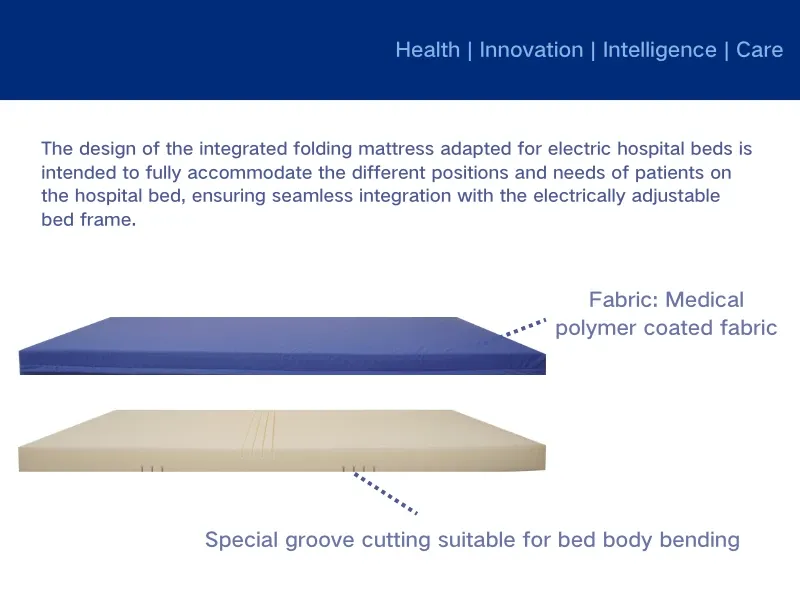The Wave Mattress: A New Standard in Patient Comfort
In the field of long-term healthcare, ensuring patient comfort is not merely a luxury—it's a medical necessity. One solution that has rapidly gained traction in both hospital and home care environments is the wave mattress. Known for its ability to adapt to the contours of the body, this specialized mattress plays a critical role in enhancing comfort and minimizing the risk of pressure sores and musculoskeletal strain in patients who are bedridden for extended periods.
What sets the wave mattress apart from conventional models is its dynamic surface technology. Designed with alternating pressure patterns, these mattresses reduce continuous pressure on any single part of the body. By simulating the natural shifts in posture that mobile individuals undergo, the wave mattress helps in maintaining proper blood flow and reducing tissue breakdown. As a result, it becomes an invaluable tool for caregivers and clinicians striving to provide superior long-term care.

Exploring the Features of a Wave Hybrid Mattress
Among the various models available, the wave hybrid mattress has emerged as a preferred option in advanced healthcare settings. This type of mattress combines the best of both foam and air-based technologies. It incorporates a supportive foam base layer to provide stability and firmness, while the top layer consists of air cells that modulate pressure and enhance comfort.
What makes the wave hybrid mattress especially effective for long-term patients is its responsiveness to body weight and movement. Patients with limited mobility often struggle with stiffness and discomfort caused by static bedding surfaces. The hybrid design counters this by adjusting air flow and distribution, resulting in a responsive sleep surface that adapts throughout the day or night.
Moreover, the wave hybrid mattress is equipped with user-friendly controls that allow caregivers to customize pressure levels, depending on the patient’s weight, medical condition, and personal comfort preferences. This level of adaptability makes it suitable for a wide range of care settings—from intensive care units to private rehabilitation rooms.
Air Wave Mattress: Optimizing Pressure Relief and Circulation
Another significant advancement in mattress technology is the air wave mattress. This model uses a series of interconnected air chambers that are automatically inflated and deflated in waves. These waves flow beneath the patient, mimicking natural movement and dramatically reducing the buildup of pressure in any one location.
The air wave mattress is particularly beneficial for patients at high risk of developing pressure ulcers or deep tissue injuries. In many cases, the mattress can be programmed to perform alternating pressure therapy at intervals recommended by a healthcare professional. This automation not only reduces the burden on caregivers but also ensures consistent and precise pressure management.
Hospitals and care facilities are increasingly turning to air wave mattress systems because of their clinical effectiveness and reliability. Their use can contribute to shorter recovery times, better skin integrity, and an overall improvement in patient quality of life.
Customization and Support with the Wave Fit Mattress
A standout feature in modern therapeutic bedding is the wave fit mattress. This mattress goes a step further by integrating smart technology that monitors patient position and adjusts mattress zones accordingly. It supports different areas of the body in real time, offering superior spinal alignment and postural support.
For long-term patients who require customized positioning due to orthopedic, neurological, or muscular issues, the wave fit mattress can be a game-changer. It ensures that each part of the body receives the correct amount of support, thereby minimizing strain on joints and muscles.
This mattress also includes temperature regulation and moisture-wicking properties to prevent skin issues related to sweat and heat buildup, which are common in long-term bedridden individuals.
Aesthetic and Functional Design in the Wavy Mattress
While functionality is key, aesthetics also matter, especially in home care environments. The wavy mattress introduces a design-forward solution that doesn’t compromise on therapeutic benefits. With its stylish, undulating surface and advanced pressure distribution, the wavy mattress appeals to users seeking a blend of comfort, elegance, and performance.
The undulating structure of the wavy mattress isn’t just for looks—it helps evenly distribute body weight and adds a gentle massage effect, which can be comforting for patients who spend most of their time in bed. Its ergonomic design complements modern interiors while continuing to serve essential medical functions.
The Wave Hybrid Mattress in Home and ICU Settings
Increasingly, products like the wave hybrid mattress are bridging the gap between hospital-grade care and home comfort. In intensive care units (ICUs), where patient conditions are critical and require constant monitoring, such mattresses provide the level of sophistication necessary to maintain patient well-being. They operate quietly, are compatible with hospital bed frames, and require minimal intervention from medical staff once set up.
For home users, the wave hybrid mattress offers a seamless integration into daily care routines. Lightweight, easy to clean, and durable, these mattresses are ideal for caregivers managing long-term conditions such as paralysis, severe arthritis, or post-surgical recovery.
The Long-Term Benefits of Wave Mattress Technology
In conclusion, the adoption of wave mattress technology—whether in the form of an wave fit mattress marks a significant evolution in patient-centered care. These products not only offer superior pressure relief and postural support but also bring adaptability and innovation to the healthcare environment.
For long-term patients, comfort and support are critical to both physical health and emotional well-being. By choosing advanced solutions such as the wave mattress or wave hybrid mattress, caregivers and institutions invest in higher quality of life, reduced complication rates, and enhanced recovery outcomes. These mattresses represent the future of therapeutic bedding—and for many patients, that future has already begun.
-
Sleep Tracking Mattress Maintenance TipsNewsJul.22,2025
-
Mattress Wave Designs for People with ArthritisNewsJul.22,2025
-
Mattress for Back Pain and Spinal AlignmentNewsJul.22,2025
-
Hypoallergenic Properties of Silicone Gel MattressNewsJul.22,2025
-
How a Gel Memory Foam Mattress Regulates TemperatureNewsJul.22,2025
-
Doctors’ Recommendations on Special Mattress for Back PainNewsJul.22,2025
-
Customizing a Patient Bed Mattress for Specific NeedsNewsJul.22,2025

